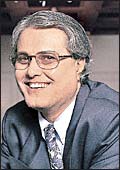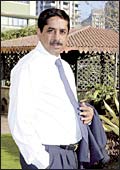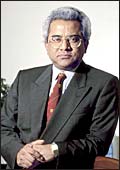|
Some
time in the mid-nineties, on one of his routine overseas trips,
Uday Kotak got lucky. He chanced upon a meeting with the Chairman
of a blue-blooded New York-headquartered global investment bank.
Kotak remembers most of the conversation that transpired during
that fleeting encounter, but there's one line of the I-bank Chief
that's been since etched in the marble of Kotak's mind. "He
explained to me the importance of spotting gold nuggets in a coalfield.
It is not easy but when you find it, you must seize it. Just as
there is danger lurking there, there is always an opportunity
lurking too," recalls the 47-year-old Vice Chairman &
Managing Director of the Kotak Mahindra Bank, which today boasts
a net worth of Rs 2,000 crore, with a presence across commercial
banking, investment banking, broking, insurance, mutual funds,
wealth management and private equity.
Perhaps it's this appealing philosophy of
finding value long before it actually reveals itself to the rest
of the world that might have persuaded Kotak to take a closer
look at a partnership with one of the Wall Street banks. In 1996
Goldman Sachs came in as a joint venture partner for the Indian
entrepreneur's broking and investment banking businesses. A decade
down the line, Kotak has pretty much mastered the knack of striking
gold in the coalfield that is Indian industry. Sidestepping pitfalls
with élan, he made investments at rock-bottom prices in
industries ranging from telecom to publishing to FMCG. Today,
those bets have appreciated much faster than the yellow metal
can ever hope to. For instance, recently Kotak sold the 8.33 per
cent his flagship Kotak Mahindra Bank and its subsidiaries held
in telecom major Hutchison Essar for an eye-popping Rs 1,019 crore.
Market observers feel Kotak wouldn't have paid much more than
Rs 4.5 crore for his initial stake.
| THE KOTAK DOSSIER |
| Age: 47
Qualifications: B.Com, MMS from Jamnalal Bajaj
Institute of Management Studies, Mumbai
Businesses built: Banking, life insurance, investment
banking, stock broking, mutual funds, auto finance, private
equity, real estate venture capital
Size of group: Net worth - Rs 2,000 crore, 6,500
people
Best known as: A deal maker par excellence
First big moment: The listing of Kotak Mahindra
Finance Limited (KMFL) in 1992
Last big deal: Buying out Goldman Sachs' 25 per
cent stake in Kotak Mahindra Capital and Kotak Securities
Vision: To build a financial institution from India
of world scale, size and quality
Ambition: To build a global level financial institution
and be consolidators in the financial space
Hobbies: Loves Indian classical music and playing
the sitar. Also played professional cricket in college
Most likely to be heard saying: If you have conviction
about India, our time has come. If that is the conviction
one has, this is the time to walk the talk
Least likely to be heard saying: "Let's sell
out."
|
 |
 |
| Uday Kotak has emerged a worthy
competitor to DSP Merrill Lynch's Hemendra Kothari (left)
and JM Morgan Stanley's Nimesh Kampani |
Goldman Sachs may have helped Kotak learn
the trick of digging the gems out of the dirt, but the high-profile
chief of the eponymous group-he joined hands with the Mahindra
family in 1985-has worked out his own homegrown recipe to translate
the value locked in those stones into big bucks. So much so, a
few weeks ago Kotak thought the time ripe to buy out Goldman's
25 per cent holding in Kotak Securities (the broking firm) and
Kotak Mahindra Capital Company (the investment bank) for Rs 333
crore. In sharp contrast, the Indian promoter at another head-on
competitor, DSP Merrill Lynch, chose to instead offload his holding
in favour of his Wall Street partner for all of $500 million (Rs
2,250 crore). Says veteran investment banker Udayan Bose, now
Chairman of Thomas Cook India: "I knew him when he started
out as a very young man and have watched his progress and have
also worked with him on transactions. I have been impressed by
his dedication, focus and commitment."
Kotak won't say it, but the message in the
buyout of Goldman Sachs is pretty clear: Thanks for the help guys,
but now it's best for Kotak Mahindra to be on its own (although
there are some market watchers who insist that it's Goldman that
wanted to be on its own in India). Compared to the global Goliaths-Goldman,
Morgan Stanley and Merrill Lynch-Kotak is a relative David on
Dalal Street. But Kotak is aiming his sling and his stone far
and wide, and not just at domestic targets. "India, Indian
institutions and Indians can have a shot at the world today. These
opportunities were not there 5-10 years ago. This is India's second
tryst with destiny," he told BT last fortnight. If that sounds
like an exaggeration and hollow bravado, take a look at the performance
of his financial services conglomerate, which in many ways is
a reflection of the buoyancy in the Indian economy and markets
and the can-do spirit that's gripped India Inc. Kotak Mahindra
Bank's deposits have soared by 85.2 per cent for the nine months
ended December 2005. Kotak Securities accounts for nearly 45 per
cent of the group's profits, the investment bank tops the league
tables for M&A deals in calendar 2005, and the group's consolidated
net profits shot up by 113.6 per cent in the April-December 2005
period. It's against such a sanguine backdrop that Kotak is now
talking about making the Next Big Leap-onto the international
stage. "Our aspiration is to be consolidators in the financial
services game rather than consolidatees. We want to be a global
institution, like JP Morgan, Goldman Sachs and Merrill Lynch.
These are family names that reflect the aspirations of a few people
in the US more than 100 years ago. (Like India today) they too
had the advantage of a large domestic market. "What may have
taken 100 years then, we have a chance to do in 10. We will give
it a shot," thunders Kotak.
| THE HOUSE THAT KOTAK BUILT |
KOTAK MAHINDRA BANK
Number of branches 53
Number of cities covered 34
Deposit base Rs 6,550 crore
Number of depositors 1,39,700
Advances portfolio Rs 5,317 crore
Source: Company, as of December 2005
PRIVATE EQUITY FUND
Funds committed Rs 700 crore
Funds deployed Rs 150 crore
Investee Companies Paramount Airways, Four Soft Limited,
Metahelix Life Sciences among others
Source: Company
KOTAK MAHINDRA OLD MUTUAL LIFE INSURANCE
Total premium Rs 375 crore
Number of policies issued 63,468
Market share 1.48 per cent
Total 1st year premium (YTD Feb'06) Rs 234 crore
Source: IRDA
KOTAK SECURITIES LTD
Total customer accounts 3,55,000
Additions More than 7,000 per month
Market share 8 per cent
Web trading customers 65,000
Source: Company
KOTAK MAHINDRA MUTUAL FUND
Total corpus Rs 8,335 crore
Number of schemes 26
Number of investors 3,39,102
Amount mobilised Rs 2,891.81 crore under new schemes
FY05-06
Source: AMFI (Figures as on Feb. 2006) make first investment
Source: Company
WEALTH MANAGEMENT
» Wealth
management offering is mounted on the banking platform
» About
70 per cent of the business comes from Mumbai, Delhi and
Bangalore
» Product
basket includes equity, mutual funds and insurance among
others
Source: Company
KOTAK MAHINDRA CAPITAL COMPANY
Number of deals 20
Volume of deals Rs 13,050 crore
Market share 14.4 %
Source: Bloomberg for Jan.-Dec. 2005
|
He's already begun taking baby steps overseas,
with a presence in Dubai, London and New York-for instance, Kotak
has a registered FII in London that's doing business of a billion
dollars. A Singapore outpost too is on the cards. Kotak today
may not compare well at all with the family-named firms on Wall
Street-Morgan Stanley for instance has Assets Under Management
to the extent of $622 billion (Rs 2,799,000 crore) in 2006. Yet,
for Kotak, this is only the beginning of a long outbound journey.
What's more, it's the huge consumption story back home that will
ensure handsome double-digit growth across virtually all his ventures-which
are a balanced combo of cyclical businesses (broking & investment
banking for instance) and the counter-cyclical ones like lending,
stress-asset recovery, and life insurance-for some time to come.
Says Hemendra Kothari, Chairman of Kotak's head-on competitor,
DSP Merrill Lynch: "His group has interests across retail
banking, insurance, investment banking and mutual funds, amongst
others. That's the greatest testament to Uday's strength and capability
as an astute financial professional."
 |
 |
"We want to take
our
share of low-cost
deposits from 16-17
per cent to 30-35 per
cent in three years"
Dipak Gupta
Executive Director
Kotak Mahindra Bank |
"In businesses like private
equity our advantage is our networking ability, which allows
us to source business"
C. Jayaram
Executive Director/Kotak Mahindra Bank |
If Kotak is convinced that India today is
"sitting on a wonderful sweet spot," it's his bank-set
up in 2003 when the then flagship Kotak Mahindra Finance Ltd (KMFL)
was converted into a bank-that will prove a major growth driver
in the domestic, retail-driven market. The bank fits in well with
Kotak's customer-focussed strategy, offering a central platform
for relationships across the group's various businesses like commercial
vehicle and retail finance, corporate banking, treasury and housing
finance. With 65 branches today, which will go up to 100 in 2006-07,
Kotak is clearly in a hurry to grow the customer base, which currently
stands at 40 lakh. "We want to build our franchises and attract
low-cost deposits. Today, low-cost deposit comprises 16-17 per
cent of the total deposits. We would like this share to improve
to 30-35 per cent possibly in the next three years," says
Dipak Gupta, Executive Director (Retail) at Kotak Mahindra Bank
Ltd (KMBL).
 |
 |
"I have worked with him
on transactions and am impressed by his dedication, focus
and commitment"
Udayan Bose
Chairman/ Thomas Cook India |
"We were never dependent
on Goldman. Today we have built our strengths on the GDR side
too"
Falguni Nayar
Managing Director/Kotak Mahindra Capital |
Yet, 100 branches would hardly be enough for
Kotak to realise his ambition of size and scale even domestically,
forget internationally. That's why inorganic growth is inevitable
although the Vice Chairman does not see too many acquisition targets
around him in the private banking space. What would prove a huge,
ideal opportunity for growth for Kotak is marriages across the
public sector and private banking space. Such a deal would make
immense sense for KMBL as it would at a stroke get a comprehensive
pan-Indian reach, both urban and rural. But Kotak will be the
first one to tell you that acquisitions of PSU banks today appear
a pipe dream at best.
If Kotak lacks size and scale today, he's
trying to make up for that via innovation and a first-mover approach.
Consider the stress-asset recovery business for instance, where
Kotak is pretty much the only private player. He sniffed the opportunity
way back in 1997-98 when KMFL set up a recovery team (for its
own balance sheet). It's competence built since then that has
allowed Kotak to look at asset-recovery as a full-fledged business,
which today is a $0.5 billion (Rs 2,250 crore) portfolio, comprising
stress-assets with a less than Rs 10 crore ticket size. "We
were early in the game, and that's enabled us to build the capabilities,"
says Kotak. Adds Gupta: "There is a huge opportunity in the
asset reconstruction business. The official value of non-performing
assets in India is Rs 1,00,000 crore." Kotak is also eyeing
setting up a separate asset reconstruction company (arc), perhaps
with a foreign partner, but "there is no compulsion at this
stage." Private equity and a real estate fund are two other
fledgling businesses that could blossom in future. "Our advantage
in a business like private equity comes from our networking ability
which means our ability to source business is high," says
C. Jayaram, Executive Director, Kotak Mahindra Bank."
| "I WANT KOTAK TO BE LIKE MORGAN, MERRILL
AND GOLDMAN" |
 A
conversation with Uday Kotak isn't only delightful
from the information he shares about his businesses, but also
for his big-picture views on subjects ranging from entrepreneurship
to his ambitions and vision to his business philosophies.
Excerpts of some of the gems, or Kotakisms, if you will. A
conversation with Uday Kotak isn't only delightful
from the information he shares about his businesses, but also
for his big-picture views on subjects ranging from entrepreneurship
to his ambitions and vision to his business philosophies.
Excerpts of some of the gems, or Kotakisms, if you will.
ON HIS ASPIRATION: To build a globally-competitive
business. The world is flat. We want to be consolidators
in the financial services business rather than be consolidatees.
To build a financial institution from India of world scale,
size and quality.
ON JOINT VENTURES: Treat your partners well and
be fair in terms of the relationship beyond the JV.
ON VALUATIONS: They are like "Maya."
What is high and low is a decision you take over a period
of time.
ON GLOBALISATION: It is not a threat. It is an
opportunity. I think that's where our mindset has changed.
ON SPOTTING OPPORTUNITIES : Keep your eyes and
ears open and you always find opportunities in financial
services. If you are in a coal field, you must have the
eye to spot gold nuggets. It is not easy but when it comes,
you must seize it. Just as there is danger lurking, there
is an opportunity lurking.
ON GOING GLOBAL: Global is in our minds. It is
about how we think, it is about our approach and what processes
we have. It is about getting people.
ON HIS FEAR: My concern is to ensure that we continue
to be the place where the best talent wants to be.
ON INDIA'S FUTURE: Our time has come. If that is
the conviction one has, this is the time to walk the talk.
ON THE GLOBAL OPPORTUNITY: India, Indian institutions
and Indians can have a shot at the world today. These chances
don't come often. These opportunities were not there 5-10
years ago. We are sitting at a wonderful sweet spot. This
is India's second tryst with destiny.
|
 |
"We want to take our market
share up from 8 per cent to 10 per cent in the next two years"
NARAYAN S.A.
Managing Director/Kotak Securities |
Another such long-term counter-cyclical business
is life insurance, because of its stability. Breakeven clearly
is some time away, three years down the line, according to Gupta.
Market share, meantime, is nothing to write home about, at meagre
1.48 per cent (the leader in the business, ICICI Prudential Life,
has a share of 6.25 per cent). "We expect an added capital
requirement of Rs 150 crore in the life business in the next three
years. In a growing insurance business, it is a trade off between
growth and profits," says Gupta. Adds Kotak. "We are
seeing positive signs in the insurance business. To me, it is
about value creation and what needs to be understood is what is
value creation versus the cost of value creation. We are getting
momentum on numbers and I feel good about the business."
Capital won't be a problem for Kotak, given the bank's $2 billion
market cap, and over Rs 1,000 crore he's mopped up via the telecom
stake sale.
What's working in Kotak's favour today is
the gung-ho stock market, with Narayan S.A., Managing Director,
Kotak Securities, growing his customer base by more than 7,000
every month. "We had a market share of 8 per cent last year
and the intention is to take it 10 per cent over the next two
years." Phenomenally, Kotak Securities contributes just under
45 per cent of the group's consolidated net profits. Is that a
good thing? Well, yes and no. Sohini Andani, Equity Analyst at
ask Raymond James, says the profitability of the Kotak Group is
vulnerable to market fluctuations because a major chunk of its
profits comes from stock broking operations. "But the positive
side is that the group has been ploughing back profits into its
other businesses like life insurance," adds Andani.
| AREAS OF CONCERN |
»
Overdependence on stockmarket operations, which
account for nearly 45 per cent of group net profits
» The
life insurance business is a cash guzzler, will take time
to break even, and Kotak is still a bit player
» Without
Goldman, Kotak might have a problem pulling off big-ticket
crossborder transactions
» The
bank needs size and scale, but there aren't too many opportunities
for inorganic growth |
The roaring indices coupled with the go-go
growth ambitions of corporate India have also brought good tidings
for Kotak on the M&A and IPO front, with business booming
here too. The big question, though, is: Can Kotak continue to
pull in the big deals and mandates without Goldman Sachs in tow?
As one investment banker points out: "The fact is that Goldman
wanted to go it alone, and perhaps that's why Kotak didn't have
to pay too much." More than IPOs, the concern is on the crossborder
M&A front, where Goldman's overseas presence has always proved
handy for Kotak. In the near term, what of course helps is the
one-year "period of cooperation" between the two parties.
What after that? Kotak counters that the Wall Street firms play
in bulge-bracket ($1 billion and over) territory, which Indian
companies have yet to step into. He gives the examples of two
recent deals done by Kotak where Goldman didn't have a role to
play at all: The exit of Thomas Cook in India when they sold their
holding to Dubai Financial and the acquisition of a majority stake
in Micro Inks by Germany's Huber Group. Adds Falguni Nayar, Managing
Director, Kotak Mahindra Capital Co: "We were never dependent
on Goldman. Today, we have built our strengths on the GDR side
also. Our focus will now be on convertibles, GDRs and outbound
M&As."
The way Kotak sees it, being independent
doesn't mean he's alone; rather it's a great opportunity to build
his franchise and his name in global markets. He will seek alliances
when necessary, adopting a "horses for courses," mindset.
Yet, he doesn't rule out two other options: A joint venture within
the investment bank, or a mother alliance across all the businesses.
Whichever card he wishes to play, the good news for Kotak today
is that he holds a mean hand, with a couple of aces up his sleeve
for good measure.
|











 A
conversation with Uday Kotak isn't only delightful
from the information he shares about his businesses, but also
for his big-picture views on subjects ranging from entrepreneurship
to his ambitions and vision to his business philosophies.
Excerpts of some of the gems, or Kotakisms, if you will.
A
conversation with Uday Kotak isn't only delightful
from the information he shares about his businesses, but also
for his big-picture views on subjects ranging from entrepreneurship
to his ambitions and vision to his business philosophies.
Excerpts of some of the gems, or Kotakisms, if you will.
